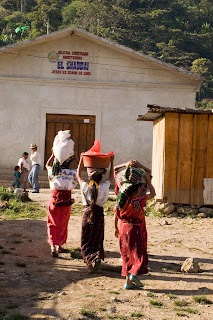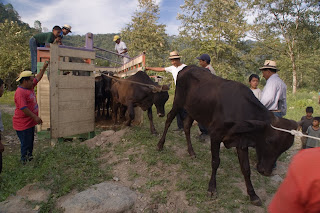THE WIDOWS OF CHEL
After I had chosen all the programs that I could afford to support but before we went to buy the cows I was approached by one of the local pastors who asked, "the people are asking me what kind of help you are offering?” I explained that all my money had been committed to the cow project and a few micro loans but he offered me the opportunity to visit some local widows and assess their needs. Although I was very interested, I made it clear that I would not be offering help but just gathering information. To me, it is a privilege every time I can enter the houses and lives of these people.
So, off we went. Mateo is a local pastor and manages a health clinic in Chel. He knew of 8
widows he wanted to introduce me to and so we began our journey. There seems to be two parts inside of me. One part that wants to dive into areas of need and poverty, and the other part that cries out "Enough! I can’t or won't be able to help...so, let me keep my eyes closed and not see the need that exists around me!!" Knowledge, especially personal knowledge of such poverty, is hard to live with without a clear way to help.

This pic is of Mateo and one of the widows inside her home. Mateo built this house for her. None of the widows I met had running water or a wood cook stove. Some own the land that they are living on and others only own their house.

The different houses vary in constuction from tin to small poles, to planks or bamboo lashed together for the walls. All measure about 10'x12' to 12'x16', with dirt floors and no windows. Windows and concrete floors are rare here anyway. This widow(above) is in her eighties and works a small plot of coffee for income. Some of the widows raise a few sheep or chickens and most can still weave. All these occupations could be enhanced to help them live a better life.

(Above) This woman was said to be 110 years old and was not much over 4 ft tall. She said she was having a little trouble with her knees and some breathing problems. I was having breathing problems with the smoldering fire in her little house as well. The picture doesn't show the threadbare condition of her clothes.

Here is the kichen. None of these three widows have immediate family that can help. Nor do they have wood stoves and they must live alone. I didn't say anything but knew that I would not be able to walk away without determining in my heart to help a little. Later I was able to purchase some bulk staples and then distributed it to the widows at Manuel's house. (See Pics Below) This day has given birth to a great idea but I will write more on this later.

These are my friends Manuel and Mateo. Manuel had just recently built this house and it was one of the three nicest houses I had been in there. He has ten children, three beds ,a one room house,and a big heart.


We baggged up #200 of corn #30 of rice and #30 of beans, some vegtables and a few pounds of sugar.

I am impressed with the pride and abilities of these women.

Youth and the elderly are active partners in this society

Here is two of Manuel's girls helping carry food home


A balancing act. It is amazing how nonchalante thiese women can carry large bulky objects on their heads. The bag she is carrying represents about one third of the food that we will be able to provide in the future. More about this later.

Heading home. The church in the background is where Mateo is the pastor.
Since I do not yet have good command of the Spanish language, this barrier exists to good communication. But at the end of the day Manuel used simple words to comunicate clearly, "Hizo un buen dia." or "It was a good day. "

A very good day!!
Asi que pasa ahora --So what is happening now! Two friends have donated $700 and I have added another $140 that will fund the food program for the another three months. I asked for a survey of the Chel community thinking that we would find about 22 -24 widows in total. The survey results found 50 widows! We selected the 20 based on the criteria of age, need, lack of family members to assist them, their ability to work, and their housing conditions. For $15 per month we will provide #33 of corn, #10 of rice or beans #2 of sugar and $2 of vegetables, i.e. onions, cabbage, or carrots for each widow. 100% of this money would go DIRECTLY to these widows. As we hear in the International News, we all know that the world's poor are struggling with rising food prices. This is a simple and direct way to make a difference. This represents my first request for funds. I am trying to develop a non-profit organization which would be audited by a third party with the intention of enlarging our impact upon the Ixil people of this region. Please contact me if you are interested.
This is just a beginning.
 Here is Gaspar, a part time teacher and carpenter planing a table top. In the last year his village has received electricity which has opened up new possibilities. Carpentry tools are about 30% higher in Guatemala and, with the local low wages, it is very difficult to buy enough tools. I bought about $1200 worth of tools and set-up an interest free loan for $800 dollars and gifted the rest. For three weeks his family fed and housed me and I tried to teach them a little carpentry. The next three loans that I made in this community have the added feature so that the loan payments will go to the school to help buy books for a reading library.
Here is Gaspar, a part time teacher and carpenter planing a table top. In the last year his village has received electricity which has opened up new possibilities. Carpentry tools are about 30% higher in Guatemala and, with the local low wages, it is very difficult to buy enough tools. I bought about $1200 worth of tools and set-up an interest free loan for $800 dollars and gifted the rest. For three weeks his family fed and housed me and I tried to teach them a little carpentry. The next three loans that I made in this community have the added feature so that the loan payments will go to the school to help buy books for a reading library. The most expensive tool I bought was this tablesaw. In this picture Gaspar is routering a table leg.
The most expensive tool I bought was this tablesaw. In this picture Gaspar is routering a table leg. Here he is cutting some decorative diamonds into the table top.
Here he is cutting some decorative diamonds into the table top. The finished product: Total value $50 .Materials $15. Time to build, 3 days. A good profit in a economy that generally pays $3 -$10 a day.
The finished product: Total value $50 .Materials $15. Time to build, 3 days. A good profit in a economy that generally pays $3 -$10 a day. Another entrepreneur I met had an ice-cream business. He would travel three hours to buy ice and then store it in a gunnysack of wood shavings to insulate it. It was a race in order to sell shaved-iced cones before his ice melted and then he would have to travel back for more. Now he has a freezer and can sell ice, bags of frozen fruit water and shaved-ice cones. Here he is with his new freezer and ice cream cart.
Another entrepreneur I met had an ice-cream business. He would travel three hours to buy ice and then store it in a gunnysack of wood shavings to insulate it. It was a race in order to sell shaved-iced cones before his ice melted and then he would have to travel back for more. Now he has a freezer and can sell ice, bags of frozen fruit water and shaved-ice cones. Here he is with his new freezer and ice cream cart.













































